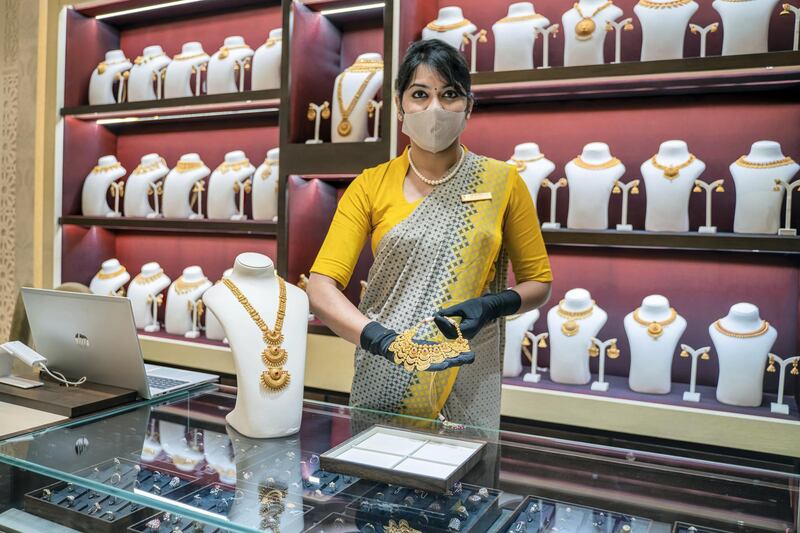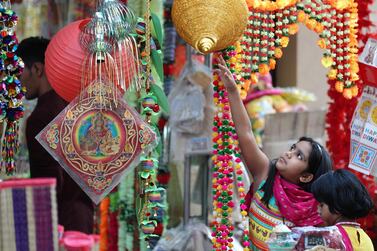The Hindu festival of lights falls on Saturday, November 14, this year. In the pre-Covid era, Diwali was punctuated by buying new clothes and jewels, and meeting almost everyone you know at family gatherings and society parties within the span of five days.
Jewellery buying
The celebrations begin with Dhanteras – on Friday, November 13 this year – which is considered an auspicious day to buy jewellery, especially gold, in a bid to please Lakshmi, the goddess of prosperity. The first day of Diwali usually sees a rise in jewellery purchases, but buying trends have shifted slightly this year, with smaller labels feeling the heat.
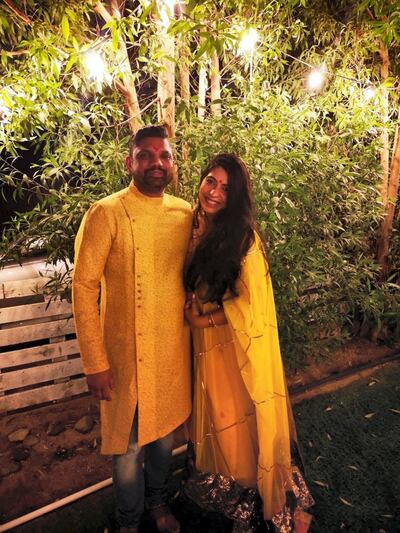
Jewellery designer Bhavya Airan, who launched her semi-precious jewellery brand Dori in the UAE five years ago, says Diwali is usually peak season for her business, but she has seen a 40 per cent drop compared to the same time last year.
“Diwali is also about gifting, but because people are not going out to events, they are not spending as much,” she says. “Everyone is cautious, especially when it comes to buying non-essential goods, which is what jewellery is.”
This is not, however, the case for fine-jewellery designer and gemmologist Vikram Jethwani who, along with his wife Natasha, launched Vik Jethwani Fine Jewellery seven years ago in Dubai. “This time of the year, every year, is our season because of Dhanteras, Diwali and Christmas. With the weather getting better, people are getting out more,” he says. “Many have not gone on their summer holidays. They are all here and [many] do have disposable income.”
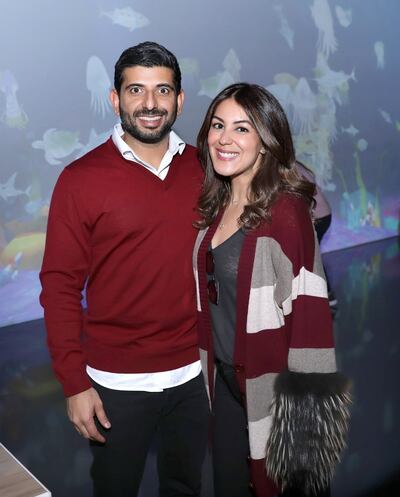
The one thing that has changed, he says, is the way his brand is promoting its offerings. "By mid-October, we usually have a lavish party to showcase our latest lines, but because of the restrictions we've decided to go fully digital and launch our next two collections via an online show," Jethwani says. "If the customer cannot come to us, we will go to the customer instead."
To cash in on the festive-buying period, one of India’s best-known jewellery brands, Tanishq, owned by the risk-savvy Tata Group, opened its first UAE store in Dubai last month. This is its first international outpost.
“Indians consider the festive season, which began on October 17 with Navaratri this year, as an auspicious time to buy jewellery. Typically 30 to 32 per cent of total annual sales for most Indian jewellers comes in this quarter,” says Kuruvilla Markose, chief operations officer for Tanishq’s international business division.
“The biggest boost for the jewellery industry is expected to come from the festivals of Dhanteras and Diwali. Our research shows that people [in the UAE] are revved [up] to make jewellery purchases, especially given the festive and holiday season, so we expect a great start.”
Fashion trunk shows
The same cannot be said for the number of seasonal fashion exhibitions and trunk shows of desi designers typically held around this time.
Sharjah businesswoman Anuradha Agarwal, who has been hosting Modista exhibitions in Dubai three times a year since 2013, says she had to scale down for the latest edition held last month.
"We would generally have more than 65 designers from India, Pakistan and the UAE. This season, we had 38," she says, but adds she was impressed with the turnout.
“We made a conscious decision to have more affordable designers, but it looks like people still buy clothes even if they are not going out. They still want to wear new clothes.”
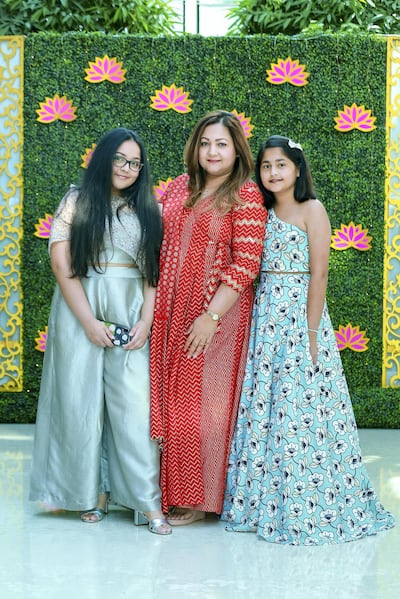
Dubai entrepreneur Shefali Munshi, who also hosts a number of exhibitions at this time, decided to do only one this season. "We usually have 10 to 12 designers, but this year we only had two, a jewellery designer from India and a high-end fashion designer from Pakistan," she says. "Yes, people are not splurging, but they are still spending consciously. Some still bought jewellery worth Dh50,000, for example."
Diwali parties … with family only
In the weeks leading up to Diwali, Munshi would have ticked off most of the things on the list for her annual Diwali bash: shopping for new clothes; sending out invitations; booking a DJ and sorting out the catering. But the pandemic has changed all that.
Instead this year, Munshi and her mother Neharika, 71, who is visiting from India, are preparing to invite only close friends and perform the obligatory rituals.
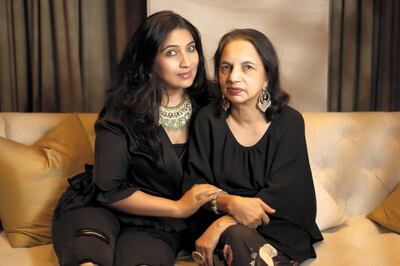
"I usually host a Diwali party for 50 to 60 people, but there will be no such thing this year. I also don't want to expose my mother to anything because of her age," Munshi says.
Traditionally marked by the lighting up of homes to signify the triumph of light over darkness, Diwali is also when many families gather to exchange gifts and sweets. Some prepare for weeks for many social engagements across the five days.
"I usually receive eight to 10 invitations by this time. This year, I haven't received a single one," says mother-of-two Agarwal, who lives in Sharjah. "I've also decided not to host anything at home this year because many of our close friends recently tested positive for Covid-19."
For Dubai restaurateur Mohit Bhojwani’s family, while all traditional rituals will be observed, including the cleansing of homes and offices, one main highlight of the festival has been called off.
“Every year, we do an open house at my uncle’s villa in Dubai where extended family and their friends would gather. We would host about 200 guests in one night with people coming in and out from 8pm to 3am. This year, we will limit it to immediate family only,” says Bhojwani. “We are still buying new clothes because Diwali also marks the new year for many of us. And we will still light up the house. But it will be different.”
Airan says Diwali will have a new focus for her and her family this year. “Yes, it’s a festive time, but there will be no big parties. For us celebrations have always been about giving anyway,” she says. “Whether it’s providing free meals or donating to an animal rescue, at the end of the day, you’re looking for happiness and joy. And I think giving brings you more happiness than anything else. So we’re going to do more of that this year.”
The pandemic, then, has led to a change in perspective for many. For Munshi's mum Neharika, the best thing about Diwali used to be wearing new clothes and cleansing the house, but, she says, the current situation has forced everyone to focus on family first.
“Diwali or any occasion brings people together and in this new normal, we are far more bonded emotionally,” she says. “With so much uncertainty around, there’s also a lot more gratitude.”
